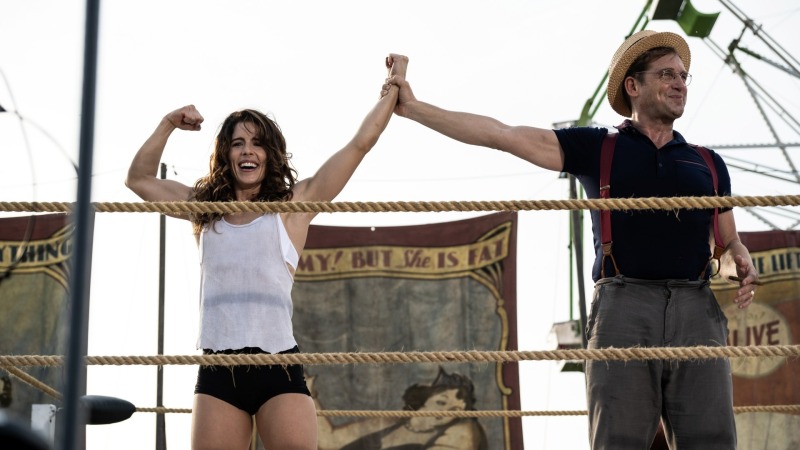Wrestling Biopic Queen of the Ring Doesn’t Do the Job

Queen of the Ring, a new biopic about 20th century pro wrestling legend Mildred Burke, is like a portal into the past. Not to Burke’s Depression-era and post-war heyday, even though that’s when it’s set, but to the days when the TV networks produced a steady stream of original TV movies, almost all of which were instantly forgotten. Queen of the Ring might be playing in theaters right now, but it’s the most made-for-TV movie I’ve seen in a while.
It doesn’t have to be this way. Pro wrestling history is weird and fascinating and should be a goldmine for Hollywood, with its mixture of fact and fiction, its close proximity to outright criminality, and the always unsteady business relationships between its network of regional promoters. There have been maybe two good non-documentaries about wrestling ever, though, and both are about fictional characters. And Mildred Burke—the focus of Queen of the Ring, and one of the biggest stars in the business during a boom period for women’s wrestling—makes an ideal subject for a film.
Unfortunately Ash Avildsen, Queen of the Ring’s writer and director, directs it like one of those old network TV movies. It’s a straightforward, surface-level summary of Burke’s career and personal life, with many facts changed or elided over for dramatic effect. And yet the drama remains inert throughout, despite Burke’s genuinely compelling life and fine performances from most of its cast. Blame the awkward, clunky, expository dialogue, the newsreel-style montages that try to add zip but look cheap and ring false, and the emphasis on a feud with an antagonist whose actor brings little to the role. It’s all perfunctory, paint-by-numbers, and played out, without the spark or personality that separates journeyman wrestlers from the real stars.
Emily Bett Rickards, the movie’s star, deserves better. She’s able to sell Burke’s physical and emotional resilience, from the desperation and ambition that drives her into wrestling, to the power and grace of her matches, to the disappointment and pragmatism with which Burke faces betrayal. Josh Lucas, a perfect Hollywood version of what’s called a “good hand” in the wrestling business, channels the charisma and cruelty of Billy Wolfe, the small-time carnival wrestler who trained, managed, married, abused and betrayed Burke. The rest of the cast are generally given a single note to play—Francesca Eastwood as the take-no-shit Mae Young, Deborah Ann Woll as the spitfire Gladys Gillem, Damaris Lewis as the proud Babs Wingo—and yet they all make an impression despite their limited characters. They all deserve a better movie.
You can get a glimpse of that better movie during the 10 or so minutes that Walton Goggins is on screen. This superlative scene-stealer waltzes in at about the 25 minute mark, playing the controversial promoter Jack Pfefer, and the pulse immediately picks up. His few scenes are consistently the movie’s best; as solid as the rest of the cast is, he’s perhaps the only actor here who captures the showmanship that really defines professional wrestling. It’s unfortunate that in a movie about a pioneering women’s wrestler—really, the first major star in women’s wrestling—the moment that most captures the spark of pro wrestling is a scene exclusively involving men, when Goggins’ Pfefer helps Gorgeous George (Adam Demos) and Jim Mitchell (Khalid Greenaway) find the drama in their dueling promos, prompting and provoking them until their tentative deliveries turn into over-the-top proclamations.
-

-

-

-

-

-

-

-

-

-

-

-

-

-

-

-

-

-

-

-

-

-

-

-

-

-

-

-

-

-

-

-

-

-

-

-

-

-

-

-








































